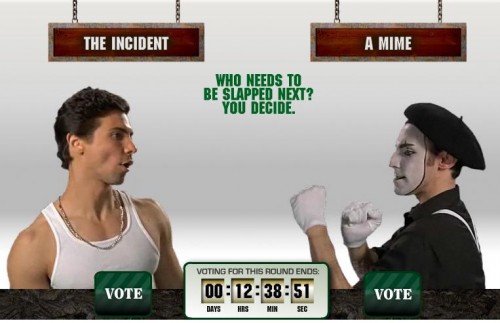
Last week I posted about some potential problems of “awareness branding,” when products are marketed by promising to make a donation to breast cancer research, or wilderness restoration, or something of the sort. Greg P. then sent me a link to a video on RSA Comment where economist/philosopher Slavoj Zizek argues against a reliance on private charity, and particularly ethical consumption, as a solution to global problems. He suggests that, say, buying fair-trade coffee at Starbucks is unlikely to relieve inequities that are directly related to global capitalism (of which Starbucks is a part and beneficiary), and may in fact reinforce them by making individuals in more privileged nations feel like they’ve done something to address the problem, thus relieving them of any obligation to look more deeply into the problem:
In this 9-minute GRIT TV video, Kimberle Crenshaw, a law professor who coined the term “intersectionality,” discusses what’s wrong with a “color-blind” approach to politics:
Via Racialicious.
Lisa Wade, PhD is an Associate Professor at Tulane University. She is the author of American Hookup, a book about college sexual culture; a textbook about gender; and a forthcoming introductory text: Terrible Magnificent Sociology. You can follow her on Twitter and Instagram.
In Dude, You’re a Fag: Masculinity and Sexuality in High School C.J. Pascoe explains that taunts of “fag” aren’t really about homosexuality at all, but instead about policing the boundaries of masculinity:
For a pretty scary example, see our recent post in which Yankees fans ganged up on two teenage Red Sox fans using homophobic language.
Lisa Wade, PhD is an Associate Professor at Tulane University. She is the author of American Hookup, a book about college sexual culture; a textbook about gender; and a forthcoming introductory text: Terrible Magnificent Sociology. You can follow her on Twitter and Instagram.
Cross-posted at Jezebel.
Since Lisa posted about the Old Spice guy today, I thought I’d post about a reaction to it. Stephanie V. let us know about Brut’s new feature on their website, Some Men Just Need to be Slapped. The…game (?) presents Man in a Towel, clearly meant as a parody of the Old Spice character:
You are then invited to slap him with various items:
In each case the hand shown slapping him is a woman’s, though for some reason when you click the option to slap him with Brut, it’s just an empty hand, not the actual bottle. Presumably her palm has Brut on it.
You can also then choose who should be the next slapping option — a character called The Incident (a parody of The Situation from Jersey Shore) or a mime:
Brut is going with the theme common in men’s hygiene products, which is to reinforce a certain stereotypical type of masculinity. Their website refers to Brut as “essence of man”:
As Stephanie says, “I didn’t even know they still made Brut — but clearly they’re trying to hone in on the Old Spice crowd by challenging their manhood.” And how better to denigrate a guy as insufficiently masculine? Show him being slapped by a woman, of course.

How ironic that so many women are telling men to “man up.” Enjoy:
Thanks Dmitriy T.M.
Lisa Wade, PhD is an Associate Professor at Tulane University. She is the author of American Hookup, a book about college sexual culture; a textbook about gender; and a forthcoming introductory text: Terrible Magnificent Sociology. You can follow her on Twitter and Instagram.
Being a voter in Nevada, I have been inundated with political mailers this season. I have clearly been identified as a Liberated Woman Voter who will respond to arguments that a candidate’s opponent hates women and plans to have us all chained in the kitchen immediately upon taking office. I meant to save some of the images from the mailers for a post about targeting female voters, but I forgot to. Well, not so much forgot as became so overwhelmed with the pile that I threw them away. Apparently I have not been targeted as a voter who cares about environmental concerns and might be horrified by the number of things I’m receiving in the mail, often the identical mailer several times a week.
Luckily, Leigh C. sent us a nice example. Leigh got both of these voter guides in the mail on the same day, both from the exact same group, with the exact same content inside. However, as you’ll notice, one is the default guide, and one is the guide specifically for women. And how do you clearly signal something is for women? With a flower! (Or, as Leigh put it, a “vaginal poppy”):
The mailers I got tended to prominently feature women in business suits, the universal signal for Liberated Career Women, obviously.

Christine O’Donnell, the Republican nominee for Delaware’s senate seat, recently released a campaign commercial that claims that she is you (i.e., Delaware voters) and that, if she were elected she would do exactly what you would do if you went to Congress.
As Jay Smooth points out, the O’Donnell commercial is an excellent example of populist rhetoric. A populist, as opposed to an elitist, believes in the “…wisdom, or virtues of the common people” (miriam-webster). When O’Donnell says that she is you, she is saying that she is just a regular person, not a political elite. Further, she is asserting that regular people are better suited to govern than those elites. Therefore, we should vote for her because there is nothing special about her that makes her fit for governance… at least nothing special that you don’t share.
Smooth says it better:
Lisa Wade, PhD is an Associate Professor at Tulane University. She is the author of American Hookup, a book about college sexual culture; a textbook about gender; and a forthcoming introductory text: Terrible Magnificent Sociology. You can follow her on Twitter and Instagram.
Today Californians vote as to whether to legalize marijuana. Chris Uggen at Public Criminology explains:
This measure (1) legalizes various marijuana-related activities, (2) allows local governments to regulate these activities, (3) permits local governments to impose and collect marijuana-related fees and taxes, and (4) authorizes various criminal and civil penalties.
There is a chance that the measure will pass; Gallup polls of U.S. opinion show that support for legalization has grown over time:
What will happen if California becomes the first state to legalize marijuana is the stuff of speculation or, more generously, modeling. Uggen points to the work of scholars employed at the RAND Drug Policy Research Center (Beau Kilmer, Jonathan P. Caulkins, Rosalie Liccardo Pacula, Robert J. MacCoun, and Peter H. Reuter). According to their models:
(1) the pretax retail price of marijuana will substantially decline, likely by more than 80 percent. The price the consumers face will depend heavily on taxes, the structure of the regulatory regime, and how taxes and regulations are enforced;
(2) consumption will increase, but it is unclear how much, because we know neither the shape of the demand curve nor the level of tax evasion (which reduces revenues and prices that consumers face);
(3) tax revenues could be dramatically lower or higher than the $1.4 billion estimate provided by the California Board of Equalization (BOE); for example, uncertainty about the federal response to California legalization can swing estimates in either direction;
(4) previous studies find that the annual costs of enforcing marijuana laws in California range from around $200 million to nearly $1.9 billion; our estimates show that the costs are probably less than $300 million; and
(5) there is considerable uncertainty about the impact of legalizing marijuana in California on public budgets and consumption, with even minor changes in assumptions leading to major differences in outcomes.
In other words, it’s really hard to tell what the consequences of legalizing marijuana will be! Uggen urges caution.
Lisa Wade, PhD is an Associate Professor at Tulane University. She is the author of American Hookup, a book about college sexual culture; a textbook about gender; and a forthcoming introductory text: Terrible Magnificent Sociology. You can follow her on Twitter and Instagram.






